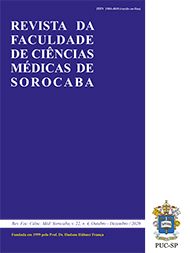Chronic kidney disease follow-up in primary healthcare
DOI:
https://doi.org/10.23925/1984-4840.2020v22i4a9Keywords:
Chronic Kidney Disease, Primary Care, Primary Health CareAbstract
Objective: To evaluate the efficiency and barriers linked to the management by primary care physicians (PCPs) of patients with chronic kidney disease (CKD). Method: Qualitative study based on a questionnaire self-applied to PCP in two cities of the state of São Paulo. The data were compared in an interview conducted with a secondary care nephrologist. Results: The data were gathered from 42 PCPs, from 28 basic healthcare units. Most of the respondentes were white, male, had graduated in Brazil and were aged between 26 and 64 years old. They had been in practice for 9,8 years on average, seeing < 10 patients with CKD per week. Their positive answers referred to diagnosis, health education and avoiding nephrotoxic agents. They reported having their own tools to avoid nephrotoxicity and to treat high blood pressure, but the majority (66,7%) do not follow any guideline for the management of CKD. Primary healthcare institutions do not provide educational resources for PCPs to monitor patients with CKD. The main elements obtained from secondary nephrological care indicate the following disagreements: early referral; schedule overload; loss in the counter- referral; absence of municipal protocols. Conclusion: For the management of patients with CKD, primary care professionals often use their own resources and demonstrate insecurity regarding specific aspects of the disease. Primary healthcare institutions neither offer tools nor supplies training for PCPs or establishes local protocols. Matrix-based support seems to be the most appropriate training strategy for this situation.
References
Pereira ERS, Pereira AC, Andrade GB de, Naghettini AV, Pinto FKMS, Batista SR, et al. Prevalence of chronic renal disease in adults attended by the Family health strategy. J Bras Nefrol. 2016;38(1):22-30. https://doi.org/10.5935/0101-2800.20160005
Alcalde PR, Kirsztajn GM. Expenses of the Brazilian Public Healthcare System with chronic kidney disease. Braz J Nephrol. 2018;40(2):122-9. https://doi.org/10.1590/2175-8239-jbn-3918
Chen TK, Knicely DH, Grams ME. Chronic kidney disease diagnosis and management. JAMA. 2019;322(13):1294. https://doi.org/10.1001/jama.2019.14745
Jager KJ, Kovesdy C, Langham R, Rosenberg M, Jha V, Zoccali C. A single number for advocacy
and communication—worldwide more than 850 million individuals have kidney diseases. Kidney Int. 2019;96(5):1048-50. https://doi.org/10.1016/j.kint.2019.07.012
Marinho AWGB, Penha AP, Silva MT, Galvão TF. Prevalência de doença renal crônica em adultos no Brasil: revisão sistemática da literatura. Cad Saúde Colet. 2017;25(3):379-88. https://doi.org/10.1590/1414-462x201700030134
Paula EA de, Costa MB, Colugnati FAB, Bastos RMR, Vanelli CP, Leite CCA, et al. Strengths of primary healthcare regarding care provided for chronic kidney disease. Rev Lat Am Enfermagem. 2016;24(0). https://doi.org/10.1590/1518-8345.1234.2801
Freitas MJR. Avaliação da Atenção à Pessoa Portadora de Doença Renal Crônica na Atenção Básica à Saúde e Profissionais de Saúde. 2017.
Pena PFA, Silva Júnior AG, Oliveira PTR, Moreira GAR, Libório AB. Cuidado ao paciente com Doença Renal Crônica no nível primário: pensando a integralidade e o matriciamento. Cien Saude Colet. 2012;17(11):3135-44. https://doi.org/10.1590/s1413-81232012001100029
Grill AK, Brimble S. Approach to the detection and management of chronic kidney disease: what primary care providers need to know. Can Fam Physician. 2018;64(10):728-35.
Bello AK, Ronksley PE, Tangri N, Kurzawa J, Osman MA, Singer A, et al. Quality of Chronic Kidney Disease Management in Canadian Primary Care. JAMA Network Open. 2019;2(9):e1910704. https://doi.org/10.1001/jamanetworkopen.2019.10704
Sperati CJ, Soman S, Agrawal V, Liu Y, Abdel-Kader K, Diamantidis CJ, et al. Primary care physicians’ perceptions of barriers and facilitators to management of chronic kidney disease: a mixed methods study. PLoS ONE. 2019;14(8):e0221325. https://doi.org/10.1371/journal.pone.0221325
Scheffer M, Cassenote A, Guerra A, Guilloux AGA, Brandão APD, Miotto BA, et al. Demografia Médica no Brasil 2020. São Paulo, SP: FMUSP, CFM; 2020. p. 35-36.
Peralta CA, Livaudais-Toman J, Stebbins M, Lo L, Robinson A, Pathak S, et al. Electronic Decision Support for Management of CKD in Primary Care: A Pragmatic Randomized Trial. Am J Kidney Dis. 2020;76(5):636-44. https://doi.org/10.1053/j.ajkd.2020.05.013
Foti K, Chang AR. CKD Management in primary care: supporting systems change. Am J Kidney Dis. 2020;76(5):613-5. https://doi.org/10.1053/j.ajkd.2020.07.008
Litvin CB, Nietert PJ, Jenkins RG, Wessell AM, Nemeth LS, Ornstein SM. Translating CKD research into primary care practice: a group-randomized study. J Gen Intern Med. 2020;35(5):1435-43. https://doi.org/10.1007/s11606-019-05353-4
Greer RC, Liu Y, Cavanaugh K, Diamantidis CJ, Estrella MM, Sperati CJ, et al. Primary care physicians’ perceived barriers to nephrology referral and comanagement of patients with CKD: a qualitative study. J Gen Intern Med. 2019;34(7):1228-35. https://doi.org/10.1007/s11606-019-04975-y
Downloads
Published
How to Cite
License
Copyright (c) 2022 Revista da Faculdade de Ciências Médicas de Sorocaba

This work is licensed under a Creative Commons Attribution-NonCommercial 4.0 International License.
Os autores no momento da submissão transferem os direitos autorais, assim, os manuscritos publicados passam a ser propriedade da revista.
O conteúdo do periódico está licenciado sob uma Licença Creative Commons 4.0, esta licença permite o livre acesso imediato ao trabalho e que qualquer usuário leia, baixe, copie, distribua, imprima, pesquise ou vincule aos textos completos dos artigos, rastreando-os para indexação, passá-los como dados para o software, ou usá-los para qualquer outra finalidade legal.

 Este obra está licenciada com uma Licença
Este obra está licenciada com uma Licença 